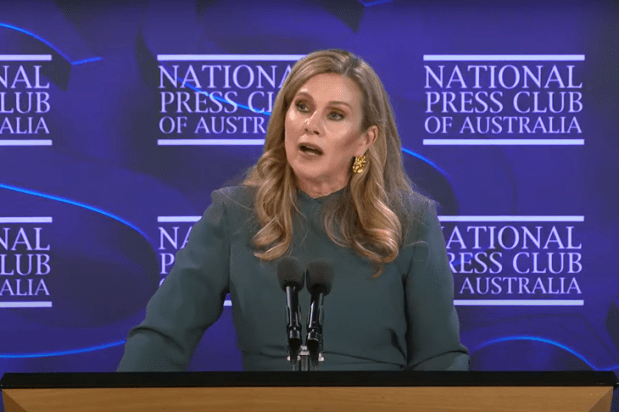Australia has an austerity problem. The country, which once prided itself on its larrikinism and self-determination, has been so admonished over Aboriginal affairs in the past decade that it has surrendered to excessive activism.
Acknowledgements of country have become a familiar part of the daily and weekly routines of Australian people. At the start of a school class, university lecture, work meeting, or public event, silence falls over the crowd and they are reminded that the land on which they live was stolen by British colonists.
The wording might vary, but it often goes like this:
‘We begin today by acknowledging the Traditional Custodians of the land on which we gather, and pay our respects to Elders past, present and future. I extend that respect to Aboriginal and Torres Strait Islander peoples here today. Sovereignty has never been ceded. It always was and always will be, Aboriginal land.’
The sermon has become part and parcel of everyday life.
There is no denying that the British parked their ships, committed atrocities, and laid dubious claims to land that did not belong to them. However, incessantly reinforcing the notion that people centuries removed from these events – families, newlyweds, immigrants – somehow do not have a right to their own property only serves to hinder the country’s progress.
The act of acknowledgment itself is only entry-level self-flagellation.
Australian businesses routinely employ Indigenous organisations to perform Welcome to Country and Smoking Ceremonies at professional meetings. The event involves an Aboriginal Elder attending corporate offices to ‘officially’ welcome the company to the land. The smoking ceremonies, which can cost in the thousands, include the expulsion of bad spirits from the office space.
The audience – more often than not composed entirely of non-Aboriginal Australians and immigrants – watch on like atheists at church, bowing their heads in deference and allowing the burning sticks to wash away their ancestral guilt.
It’s truly a bizarre occurrence. Imagine the confusion and publicity if Qantas or the Commonwealth Bank paused their operations for a robed priest to sweep through the break room with a thurible chanting ‘te deum laudamus’. It would be farcical.
These ritual practices have become so ubiquitous that they can sometimes be heard many times in the same day, even multiple times in a single meeting. They are present on most corporate websites and are even printed onto supermarket receipts. A plane lands at its destination: ‘We acknowledge the Traditional Custodians of the land on which we fly.’ A football team is playing: ‘We acknowledge the Traditional Custodians of the land on which we play.’ A CEO presents the finance update: ‘We acknowledge the Traditional Custodians of the land on which we sell homewares.’
These constant reminders that Australians reside on stolen land and must pay respect to people they don’t know and will probably never meet have become an omnipresent source of guilt-tripping.
Respect is something transactional and demonstrative, not something you can conjure through political incantation.
The rhetoric concerning Welcome to Country practices often claims that the protocol has been in use for tens of thousands of years, serving as a means for Aboriginal communities to offer safe passage to foreign tribes on their ancestral lands. However, there exists limited concrete evidence supporting the assertion that the tradition dates back further than a few decades, and the idea that it was universally practised is implausible.
However, the notion that businesses can purchase protection through a Welcome to Country ceremony is not an entirely absurd one given the foolish categorisation of dissenters as the worst kind of racists.
Many Australians have been forced into self-censorship because of the bad faith attitude among cultural elites that disagreement is tantamount to dislike, and that being sceptical of these populist policies is heretical. Such attitudes have bred antipathy among much of the population, and even Aboriginal communities are divided on the topic. Many leaders have come out against the events – including Indigenous Australian Senator, Jacinta Nampijinpa Price, who labelled the practice ‘divisive’.
The dogmatic approach towards these cultural narratives has pervaded even the highest levels of government.
The Australian Government Style Manual, the authoritative resource for government content, also widely used by private publishers, includes a chapter on correct language usage for Aboriginal and Torres Strait Islander affairs.
The advice offered by the government is a political correctness minefield that asserts phrases like ‘Indigenous Australians’ and ‘Australian Indigenous peoples’ can be discriminatory and offensive.
It also includes advice like:
Make sure to:
- Use empowering, strengths-based language.
- Tell positive stories.
- Emphasise ongoing connections to community, culture and country.
This kind of regulation underscores how rigid the discourse surrounding Aboriginal affairs has become. How can we hope to address the many dire issues – poor health outcomes, drug and alcohol addiction, high domestic abuse rates – if the government’s advice mandates only telling positive stories?
The same guide also forbids referring to Aboriginal beliefs as ‘myths’ or ‘fictional stories’ as it is ‘minimising and hurtful’. The beliefs referenced include the Bunyip, a man-eating water spirit that takes the form of an enormous starfish, and the Rainbow Serpent, an omnipotent snake that spawned humanity and literally takes the form of a rainbow when traversing from one waterhole to another.
These are beautiful stories, ones that hold profound meaning, relevant to both adults and children, Aboriginal and non-Aboriginal. But treating them as anything but fictional is truly absurd, especially considering that barely 1 per cent of Aboriginals report affiliation with an Australian Aboriginal traditional religion.
It is extremely belittling to then claim that Aboriginal people would be irreparably hurt by someone calling the Rainbow Serpent a myth. It would be like the Department of Foreign Affairs and Trade issuing travel advice cautioning visitors to Sweden against discussing Chris Hemsworth’s role as Norse god Thor in the Marvel Avengers films, lest they offend the locals.
Aboriginal people have excelled to the highest ranks of our society in politics, sport, entertainment and academia despite the challenges they face. They do not need words of acknowledgement to legitimise them, they do not need censorship to protect them.
The propaganda surrounding public cultural narratives has created an authoritarian social state in which grievance advocacy takes precedence over common sense – and a recalibration is much needed.
While the majority of Australians genuinely support and respect Aboriginal people and culture, the current climate of virtue signalling and tokenism has grown untenable, stifling free speech, and discouraging open and honest dialogue.
As the country prepares for its first referendum in 24 years, Australia stands at a critical juncture. It is imperative to move beyond symbolic gestures and take a more balanced, sensible approach to addressing historical and contemporary challenges. The country’s strength has always been its ability to adapt and evolve, and by moving beyond superficial acknowledgements and politically correct language, Australia can regain common sense in its workplaces, public events and government affairs.

























